Mamacita
Among the amazing characters I have met, my mother-in-law, Ángela Deago Rodríguez tops the list. Although she has few endearing qualities, and is, in fact, one of the thorniest persons I know, her outstanding qualities also make her one of the most memorable. Born the fourth child in a family of eight in rural Panamá in the 1920s, she had to begin work at an early age. She was usually able to avoid the picking and plowing by volunteering to go to town to sell the produce. From the age of nine, she would ride horseback crossing fields, and fording rivers to the nearest towns, sell the goods and return to the farm.
Never married, Ángela always found the way to support herself and her three children. If she had lived in another place and time, her talent, intelligence, industry and chutzpah would have led her to a successful career in sales or business. However, Lita made do with what she had. In the beginning, that meant chopping, gathering and selling firewood. As she tells it, she once sold enough wood to buy a room full of coconuts. She then set out to make and sell enough cocada to buy the materials to build her first house. She later bought sides of beef or pork to cut and sell. Essential cookware in Ángela’s house were two huge pots – one of copper for making cocada and cabanga and another of iron for frying chicharrón – all this cooking was done outdoors over an open fire, of course. Also necessary for this cottage industry were the ever-present oil drums, one for melasa for the candy and the other for manteca to fry the chicharrón.
Ángela´s primary product, however, were the chorizos that made her famous. I of course, will never forget the curtain of tripes hanging from the low, sloped ceiling of her back porch, nor the ever present smell and oiliness of pork fat. Once chopped, condimented and stuffed, Ángela would take the chorizos to sell in town, and particularly, in government offices. She would often fill tubs with the chorizos, hop on a chiva, and sell her product in Panamá City. She says that there were never enough chorizos to meet the demand and that the government officials would stand in line to be especially nice to her for the privilege of buying Lita´s chorizos, which of course, were always of the best quality. This cottage industry once brought her in the sights of the General (Torrijos).
As the story goes, Ángela was in Chitré, selling pork on the street, outside the bank. On this occasion, the meat inspector spotted her and told her she could not sell at this venue or without a permit. Ángela, not to be deterred from her enterprise, told the inspector, using the most specific, if unrepeatable language, exactly what she thought of him, and continued her sales. Not long after this, while chopping pork for chorizos, Ángela heard a knock at her door. Several national guardsmen entered, fully armed, and told her that she was to accompany them, as the General, then encamped at the beach of Parita nearby, required her presence. Ángela, who apparently never knew fear, replied that she could not leave because the pork would spoil. Unable to convince her to leave, the soldiers ended up paying her $200.00 for the pork and took her to see the General. It turns out that Torrijos, ready for some local color and a laugh, wanted to hear straight from the source exactly how Ángelita had cursed the meat inspector. This is Angelita's own Panamanian incarnation of Allende's character Belisa in "Dos palabras".
The chorizo industry also led to the business that funded Ángelita´s later years. In the late 1970s, AID loans became available in Panamá and someone had the great idea that Ángela´s chorizo business would be a great investment for such a loan. As they tried to convince her to take the loan, Ángela at first resisted. “But you could build a sanitary, commercial kitchen”, they said. But Ángela knew that the best place to make her chorizos was and would always be her back porch. “You could hire staff”, they went on to say. But Ángela knew that if she wanted something done, it was best to do it herself. Nevertheless, she says she took a $10,000.00 loan, banked it and set up a new business, extending personal loans. With this seed money, she was able to eventually pay back the AID loan and continue making loans in her old age. While some might call her rates usurious, they were probably not higher than credit cards, and her loans were easier to get in a pinch. During the U.S. embargo and invasion of 1989-1990, Ángela found another way to supplement her income. At that time, cash was not readily available and checks were unable to be cashed. Somehow, Ángela would buy these payroll checks minus a fee for her service, and pay for them in cash. Later, when cash flowed again, she would deposit the checks, making a tidy profit. In the meantime, those who had checks but no means to buy food and other neccesities were happy to get some cash.
Ángela´s gifts were not limited to financial acumen. She was also a poet. Although she had only three years of school as a child, she later completed an elementary education in night school. Her spelling was not the best, but that was not a concern as Ángela´s poems, unfortunately, were never written down. In the ancient tradition of the Spanish juglares, or the more contemporary creators of corridos and décimas, Ángela´s poetry was an oral art, and she had a mind for rhyme, meter and metaphor and an infallible memory. People would come to her house and ask for a poem in honor of this or that event, for the queen of this or that festival, and Ángela, while dicing pork or stirring cocada, would compose the poem. On one occasion, while selling something in town, she was asked to come immediately to recite one of her poems at a nearby square for some event. This time she demurred – she had not combed her hair and she had no shoes. Someone produced a comb and someone else a pair of shoes and she was on her way.
Ángela says that “La zona del canal” was actually a collaboration with another poet. She sang this décima to me in 1994, surprisingly with a few false starts, but eventually got it all out. In 1978 or 1979, at the time of the Torrijos Carter agreement, Ángela was in a hospital. A fellow poet visited her, excited about an idea he had for a poem to commemorate the event. She said that they composed this poem together.
LA ZONA DEL CANAL
Mi querido y adorado
recordado general
que me llevaste un día
a flamear mi bandera
en la zona canalera
porque otra extranjera
ay, su lugar tenía.
Quiero sembrar un maíz
en la zona del canal
y sobre el verde arrozal,
la saloma más feliz
es escuchar la perdiz
allá en la curva lejana
de encima de mi montaña
clavaré la enseña mía.
¡Ay! flor de soberanía
te rescataré mañana.
De Colón a Panamá,
¡cuantas tierras tiene el gringo
mientras yo, pobre india,
no tengo en la vida na´!
Me voy donde el pueblo va
con su daga y su sombrero
hacia el Canal compañero
de Los Santos y Herrera
de la república entera
a ver quien llega primero.
Qué bonita agricultura
en las faldas de Ancón,
la amarilla floración
entre las verdes espesuras.
Sembré maíz y verduras
desde Curundú a Gatún,
y seguiré según
me lo permita la vida.
Arroz de soberanía
cultivaré en Miraflores
el Chagres de mis dolores
me dará su agua fría.
Quiero sembrar un maíz
en la Zona del Canal,
zona de soberanía
la tierra que es tuya y mía
en la Zona del canal.
Ángela has always been an independent thinker, a trait that has often estranged her from her family. However, this very independence caused her to seek opportunities not often provided more timid souls. A Catholic by birth, she expressed an interest in other religions, and on at least one occasion attended a national Jehovah Witness conference, less I think, in a quest for religion and more out of curiousity about how people think. Her picture with the General at the National Women's Conference is another example of her quest for experiences. When she wanted to travel, she promoted tours and sold enough tickets to earn free passage. This gambit earned her several tours around Central America and one trip to Europe.
Although she was not always a pleasant person to be around, her family always seemed to find her in times of financial hardship because they knew that Ángela would never let them down when they needed help. She extended this generosity to others as well. On one occasion, a woman came to town seeking medical help for a sick child. Unfortunately, the child died and the priest refused to perform a service because the mother had no money left to pay him. In a town with many more well-to-do people, it was Ángela, the poor, single parent who gave a woman she didn´t know the money needed to bury her son.
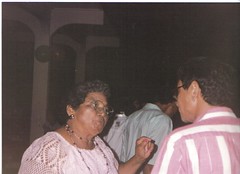
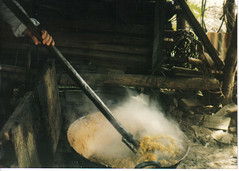
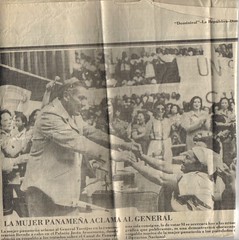
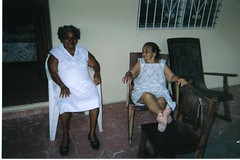
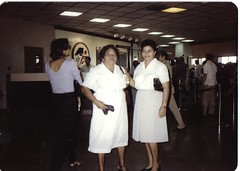


4 Comments:
Thanks Melissa. We are eager to hear about it.
This story of Ángela is wonderfulf! Thank you so much for sharing.
Very pretty design! Keep up the good work. Thanks.
»
HOLA ANGELA, ESTE POEMA Q DICES Q LO COMPUSISTE JUNTO A OTRO POETA EN REALIDAD ES UNA DECIMA Y FUE COMPUESTA POR EL ESCRITOS PANAMEÑO CARLOS FRANCISCO CHANGMARIN!!
Post a Comment
<< Home